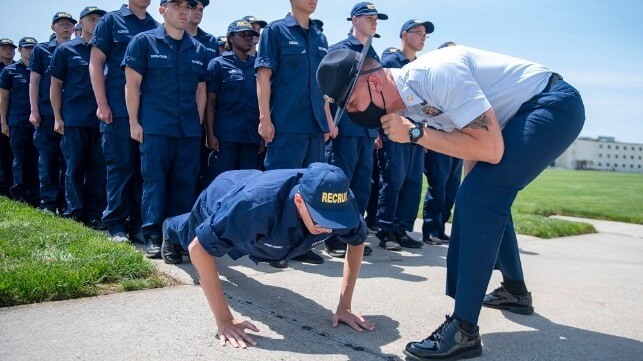Adm. Fagan: Recruiting Shortfall Threatens Coast Guard's Readiness

In an address Tuesday night, the U.S. Coast Guard's top officer warned that a tough hiring market is having a substantial impact on recruitment, and that the service is putting new effort into finding and keeping members of its active-duty workforce. To ensure that the public is aware of the service and the opportunity to serve in uniform, the Coast Guard is rolling out new recruitment-specific branding, and it is investing in a boots-on-the-ground recruiting presence in new markets.
"Our recruiting shortfall threatens our readiness and ability to serve the American people," warned Commandant Adm. Linda Fagan in her annual State of the Coast Guard address. "I have a sense of urgency to address this challenge. We must ensure that every American, from coast to coast and throughout the inland states, knows who we are and what we do."
To get after the recruiting challenge, the Coast Guard received an extra $6.5 million from Congress this year to pay for seven more recruiting offices in additional communities. The service is also adding four new Junior ROTC (high school) units, taking the total to 10. These new units will be located in Chicago; San Diego; Saraland, a community outside of Mobile, Alabama; and Clinton, Mississippi, a suburb of Jackson. In addition, the service is rolling out a new recruiting-specific logo to promote brand awareness. These efforts are aimed primarily at filling enlisted recruitment targets, Fagan said.
Retention is also a challenge in a tight job market, and Fagan outlined her plans to keep the service's best people by creating a better experience for them and their families. The Coast Guard is creating more options for servicemembers to stay in the same area and the same rank if they desire, allowing spouses and children to put down roots without moving every few years for their servicemember's next promotion or transfer. By removing "up-or-out" high-year tenure, like the Navy, the Coast Guard allows enlisteds to keep serving even if they don't get a raise in grade by a specific cutoff date.

that matters most
Get the latest maritime news delivered to your inbox daily.
The service is also making multimillion-dollar investments in training facilities, childcare, housing, healthcare, behavioral health services, parental leave, and modernized HR services, all in an effort to make the Coast Guard life more attractive. "An external network of support is equally critical to the success of our workforce. The demands of military service mean that while we recruit individuals, we retain families," said Fagan.
All branches of the armed forces are working hard to find new servicemembers and keep them in an era of historically-low unemployment. The U.S. Navy has already reduced its recruitment test score standards to the lowest level allowed by law, maximized recruitment age to 41, increased enlistment bonuses, waived past physical-fitness test failures, lifted high-year tenure, and drawn down its holding pool of Deferred Entry Program recruits to the lowest level in 40 years.
